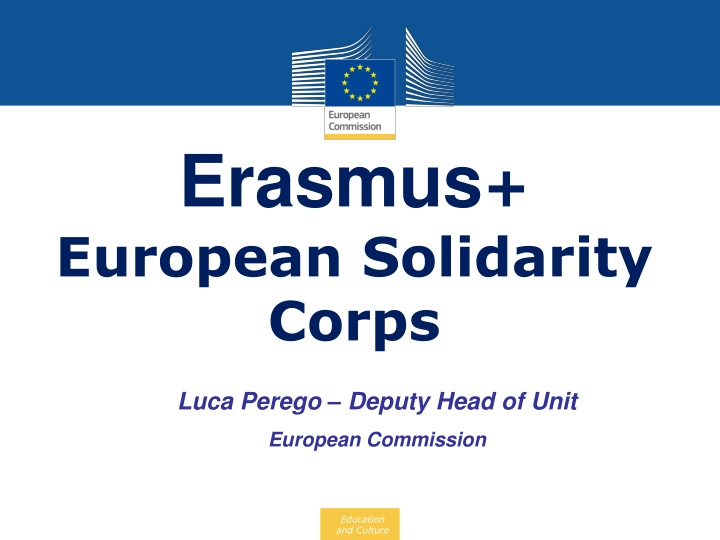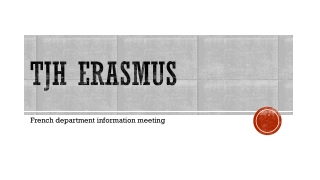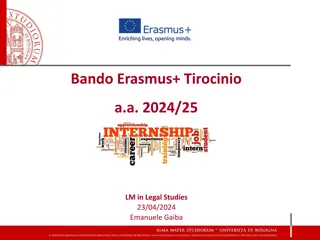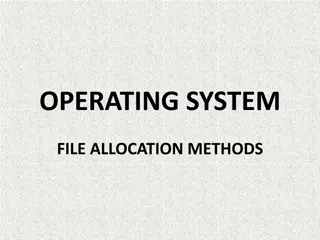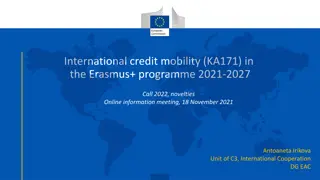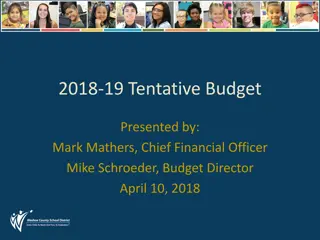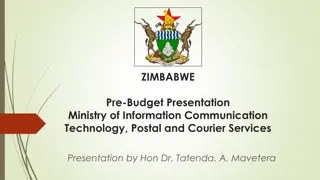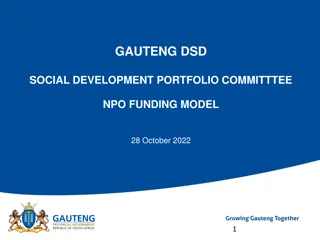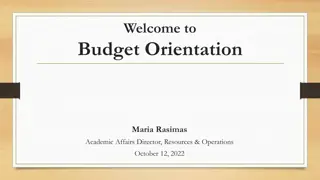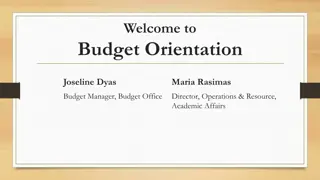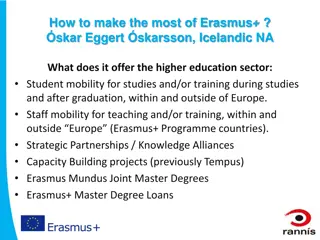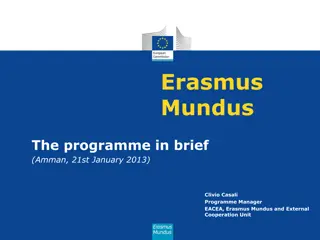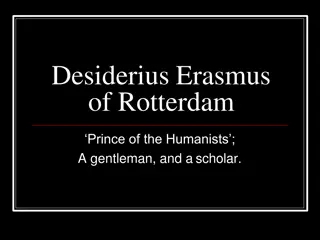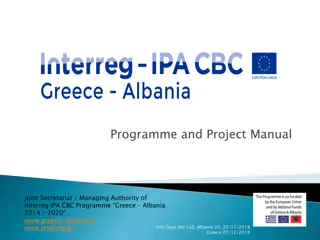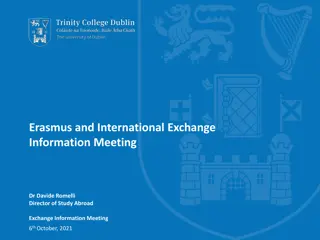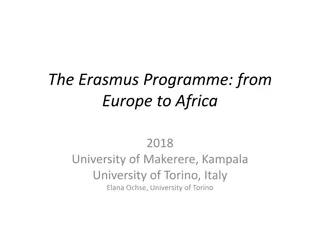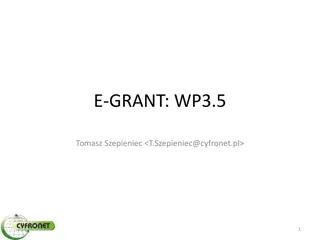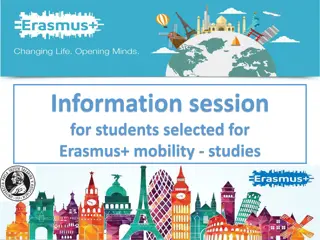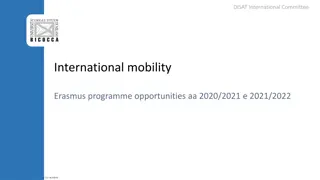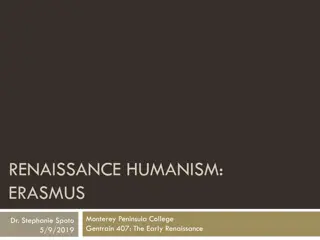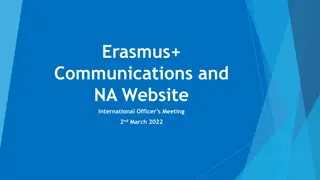Objectives of Erasmus+ Programme and Budget Allocation 2014-2020
This information provides an overview of the objectives of the Erasmus+ programme, including the Europe 2020 strategy and cooperation in education, training, and youth fields. It also highlights the budget allocation for the period 2014-2020, emphasizing the significant investment in education and training. The content discusses the structure and key actions of Erasmus+, focusing on learning mobility and cooperation for innovation.
Download Presentation

Please find below an Image/Link to download the presentation.
The content on the website is provided AS IS for your information and personal use only. It may not be sold, licensed, or shared on other websites without obtaining consent from the author.If you encounter any issues during the download, it is possible that the publisher has removed the file from their server.
You are allowed to download the files provided on this website for personal or commercial use, subject to the condition that they are used lawfully. All files are the property of their respective owners.
The content on the website is provided AS IS for your information and personal use only. It may not be sold, licensed, or shared on other websites without obtaining consent from the author.
E N D
Presentation Transcript
Erasmus+ European Solidarity Corps Luca Perego Deputy Head of Unit European Commission Education and Culture
Objectives of the programme Defined in the Erasmus+ Regulation EU 1288/2013 The objectives of the Europe 2020 strategy The objectives of the strategic framework for European cooperation in education and training (ET 2020) The sustainable development of partner countries in the field of higher education The overall objectives of the framework for European cooperation in the youth field (2010-2018) Developing the European dimension in sport, in particular grassroots sport The promotion of European values Plus: field-specific objectives Education and Culture
Erasmus+ Structure International Higher Education programmes: Lifelong Learning Programme: Previous Programmes 2007 - 2013 Youth in Action Erasmus Mundus, Tempus, Alfa, Edulink, bilateral programmes Grundtvig Erasmus Leonardo Comenius Erasmus+ One integrated Programme 2014 - 2020 Key Action 1 Key Action 3 Key Action 2 Cooperation for innovation and exchange of good practices Support for policy reform Learning mobility Specific actions: Jean Monnet, Sport Education and Culture
Budget allocation 2014 2020: 14.7 Billion 1.9%1.8% 3.4% 1.9% 3.5% Education and training (77.5%) 10.0% Youth (10%) Student loan facility (3.5%) National agencies (3.4%) Administrative costs (1.9%) Jean Monnet (1.9%) Sport (1.8%) 77.5% Education and Culture
Education, Training and Youth KA1 - Learning mobility of individuals Staff mobility, in particular for teachers, lecturers, school leaders and youth workers Mobility for higher education students, vocational education and training students Youth exchanges Student loan guarantee Joint Master degrees Education and Culture
Education, Training and Youth KA2 - Cooperation for innovation and exchange of good practices Strategic partnerships between education/training or youth organisations and other relevant actors Large scale partnerships between education and training establishments and business: Knowledge Alliances & Sector Skills alliances IT-Platforms including e-Twinning Cooperation with third countries and focus on neighbourhood countries Education and Culture
Education, Training and Youth KA3 - Support for policy reform Open method of Coordination Prospective initiatives EU recognition tools Dissemination & exploitation Policy dialogue with stakeholders, third countries and international organisations Education and Culture
Programme Countries Member States of the European Union (EU) Belgium Greece Lithuania Portugal Bulgaria Spain Luxembourg Romania Czech Republic France Hungary Slovenia Denmark Croatia Malta Slovakia Germany Italy Netherlands Finland Estonia Cyprus Austria Sweden Ireland Latvia Poland United Kingdom Non EU Programme Countries Former Yugoslav Republic of Iceland Norway Macedonia Liechtenstein Turkey Serbia (2019) Education and Culture
Partner Countries (HE and Youth) Partner Countries neighbouring the EU Western Balkans (Region 1) Eastern Partnership (Region 2) South-Mediterranean (Region 3) Russian Federation (Region 4) Albania Armenia Algeria Territory of Russia as Bosnia and Herzegovina Azerbaijan Egypt recognised by International Kosovo Belarus Israel Law Montenegro Georgia Jordan Moldova Lebanon Territory of Ukraine as Libya recognised by International Morocco Law Palestine Syria Tunisia Other Partner Countries Education and Culture
Implementation mode EC DG EAC (DG EMPL associated for certain actions) EACEA (Education, Audiovisual and Culture Executive Agency) National Agencies Erasmus+ Supporting structures (e.g. Eurydice, Europass, SALTO Youth Resource Education and Culture Centres, etc.)
National Agencies Ensuring selection and life-cycle management of grants (indirectly managed actions) Providing information about the Erasmus+ Programme Providing support to project applicants and participating organisations throughout the project life-cycle Promoting the visibility, dissemination and exploitation of the results of the Programme at local and national level Monitoring the implementation of the Programme in their country and reporting regularly to the Commission Education and Culture
Erasmus+ supporting structures Eurydice network (evidence gathering) National Teams of ECVET Experts (VET quality standards) Euroguidance network (information) eTwinning Support Services (teachers' cooperation) Eurodesk network (information) SALTO Youth Resource Centres (Quality in youth) Europass National Centres (recognition) EQF National Coordination Points (recognition) National Erasmus+ Offices (international dimension) National Academic Recognition Information Centres (recognition) Policy networks (Bologna, Structured Dialogue, Academic networks, etc.) EQAVET National Reference Points (VET quality standards Education and Culture
Italian National Agencies Agenzia nazionale per i giovani (ANG) Via Sabotino, 4 00195, Roma Progetti per la Giovent http://www.agenziagiovani.it/ Agenzia Nazionale Erasmus+ (INDIRE) Via Cesare Lombroso 6/15 50134, Firenze Progetti per le scuole, universit , formazione degli adulti http://www.erasmusplus.it/ Istituto per l'analisi delle politiche pubbliche (INAPP) Corso d'Italia 33 00198, Roma Progetti nella formazione professionale http://www.erasmusplus.it/ Education and Culture
Erasmus The next EU Programme for Education, Training, Youth and Sport - 2021-2027 Education and Culture
European Solidarity Corps The next EU Programme for Youth - 2021-2027 Education and Culture
Highlights "Evolution not revolution" while making it more inclusive and accessible broader and forward-looking more participatory and focussed on developing EU awareness more international simpler and less bureaucratic Education and Culture
Where to find more information about Erasmus+? Education and Culture
Programme Guide Overall description of the Programme (Part A) For most actions: detailed rules and procedures (Part B and C) Eligibility and exclusion criteria Selection criteria Award criteria Funding rules (types of costs supported) Modalities of application Main provisions for grant beneficiaries Education and Culture
Online sources Visit the Erasmus+ Website: http://ec.europa.eu/programmes/erasmus-plus/ Visit the European Solidarity Corps: https://europa.eu/youth/solidarity_en Visit the websites of the Erasmus+ National Agencies in your country: https://ec.europa.eu/programmes/erasmus-plus/contact/national-agencies_en Visit the EACEA dedicated space for centralised actions: https://eacea.ec.europa.eu/erasmus-plus_en Follow Erasmus+ and European Solidarity Corps on Facebook and twitter Education and Culture
Thank you for your attention! Education and Culture
